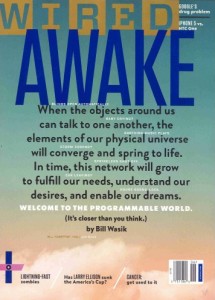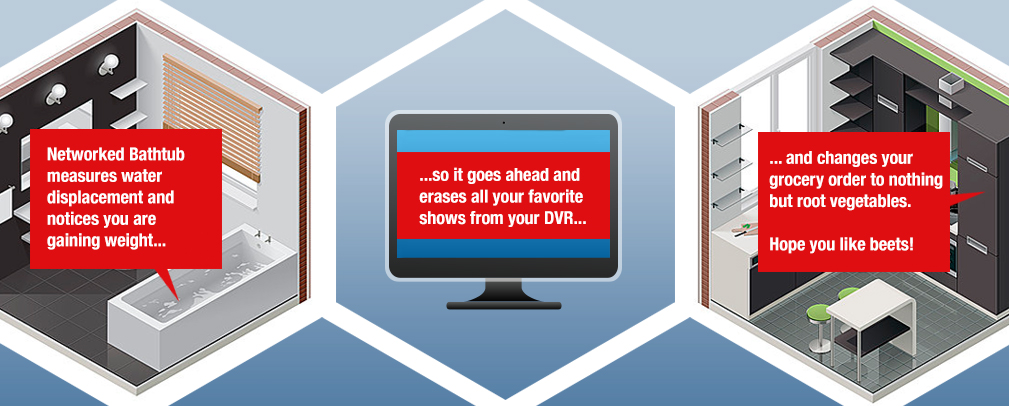“The Sensor Revolution is upon us,” I said to a friend recently, during a particularly inspired conversation about the trajectory of technology.
“I don’t see what the big deal is,” he responded, unceremoniously.
“What’s the big deal? Think about it, man! Sensors everywhere means the physical world is becoming connected. Location based technologies will enable us to automate so many things! For instance, if you were to… say… uh…”
“I’m listening.”
I furrowed my brow. “Well, just say you arrive at the airport. Your phone would automatically…”
“… automatically pull up your boarding pass?”
“Yeah, you’ve heard that one?”
“It’s like the ONLY one I hear. Why is it that every time people talk about this stuff, they always give that boarding pass example? I tell ya, accessing my flight info is not normally a pain-point in my life.”
It hadn’t registered in me until he said that, but I’ve noticed this pattern too. I first encountered it a few years ago while doing some presentation work for a large networking company,
They had requested a cinematic opening sequence for their PowerPoint to inspire their audience with a glimpse of what a sensor-based future could look like. “Basically we want to take the audience through a guided tour of 5 ways that sensor technology will enrich our lives.”
“Sounds fun,” I replied, whipping out my sketch pad. “What are the 5 scenarios you want to show?”
“Well, let’s leave that up to you,” the client responded, hopefully. “You’re the creative one.”
 Future-scenarios like these are hard to imagine, because our fantasies are normally based on the world as it exists today. (hence the endless repetition of the boarding pass scenario.) A recent article in Wired, describes the connected home as “a nervous system: a network linking together the home’s very sinews, its walls and ceilings and windows and doors”, however when we look to the info graphic for clever use-cases, we read “Sandwich shop starts your order as you approach.” and “Swimming pool heats up when there’s a barbecue on the calendar” These are subtle enhancements, (and to be fair, with wide adoption they could be game-changing) but on their own they seem trivial. Anyone with a telephone and a friend could have experienced these conveniences 50 years ago.
Future-scenarios like these are hard to imagine, because our fantasies are normally based on the world as it exists today. (hence the endless repetition of the boarding pass scenario.) A recent article in Wired, describes the connected home as “a nervous system: a network linking together the home’s very sinews, its walls and ceilings and windows and doors”, however when we look to the info graphic for clever use-cases, we read “Sandwich shop starts your order as you approach.” and “Swimming pool heats up when there’s a barbecue on the calendar” These are subtle enhancements, (and to be fair, with wide adoption they could be game-changing) but on their own they seem trivial. Anyone with a telephone and a friend could have experienced these conveniences 50 years ago.
A worse example is the 2012 movie, Parental Guidance, which featured a fictional smart home system that would tell you that “your toast is done”, and would allow you to start your vacuum cleaner from a wall mounted tablet in the next room. The filmmakers say that they “investigated the concepts of a “SmartHouse” and they met with the top designers in the industry to realistically feature technology currently being used in homes or some soon to be on the market.” Kind of like the technology featured in Minority Report, except these are bells and whistles that we don’t want. Talk about missing the mark.
From what I can tell, our lack of imagination stems from the number of mental leaps we are being asked to make. People are grasping at straws, trying to find inspiring stories about how our lives will change, once the sensor revolution is upon us. As far as I’m concerned, that means it’s a great time to be a presentation designer. Instead of pushing pixels and telling other people’s stories, we are being asked to help imagine the world of tomorrow. In a very real way, we are helping to create that world. And I’m totally fine with my imagination having that kind of reach.







I’m guessing you are familiar with ubiquitous computing - http://en.wikipedia.org/wiki/Ubiquitous_computing? If not it may be a good starting point for better analogies than the airport/boarding pass example. This future can be here now, but I don’t think enough active work is going on to develop these ubiquitous apps.
Honestly, this concept is constantly on my mind when I come across a situation where I find myself thinking, “why the f*** can’t my phone do (specific task at hand) yet”. The location/time aware reminders in iPhone 5 are a good first step. But active work needs to happen to find what you are calling “pain points” and develop a successful model to remove them.
Thanks for the link, man.
This is interesting: Mark Weiser was explicit about “the humanistic origins of the ‘invisible ideal in post-modernist thought'”, referencing as well the ironically dystopian Philip K. Dick novel Ubik.
My favorite author! Now I must read this book.
Oh and yeah… this reminds me of the parking meter conversation we had. =)